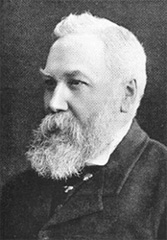The Founding of the Football League
Last night the English Football League kicked off for the 2017/18 season. The Football League in England is the oldest league system in world football-formed back in April 1888. A landmark moment in history as the first step to the current league systems that orchestrate worldwide today. Though the introduction of the Football league would not have been formed without the enthusiasm and passion of a Scotsman named William McGregor.
Mr William McGregor is known as the architect and founder of The Football League. He was born in Perthshire in 1847, moving to Birmingham in 1870 to set up a linen draper’s shop with his brother; near Villa’s home ground Aston Park. McGregor would be invited to become a committee member for the club, where he would move on to be an administrator, to then being elected President years later.
Despite the introduction of the Football Association (FA) and FA Cup ties being played, the football clubs would have the sole task of organising matches with other teams-leading to, many times, miscommunication and confusion. In 1885, McGregor shared this view in a FA meeting that professionalism in football should be accepted as the game was changing and developing- admitting that Villa had indeed already been operating in a professional type manner. At the end of the conference the FA accepted professionalism in the game. Yet, with this new professional game, matches were still being cancelled with the clubs still having to pay their players despite no match being played. More frustration was felt by all involved in the sport. McGregor took action by writing to other clubs such as Blackburn, Bolton, Preston North End and West Bromwich Albion; about the possible creation of a football league competition that would provide a number of guaranteed fixtures for its member clubs each season. However, despite Attending the first meeting in March 1888, no southern English club agreed to join this new set-up at the time.

Left: Will McGregor.
This exciting prospect proposed by McGregor was agreed by club representatives; leading to the finalising of league details in a second meeting held on 17th April 1888. The name ‘The Football League’ was chosen amongst the member clubs. Interestingly, the proposed name ‘The English League’ was avoided in order to leave the possibility of future applications from Scottish clubs joining the league. McGregor also proposed a rule that only one club from each town should be included. The other founders agreed to this rule, which caused controversy, as it meant Birmingham team Mitchell St. George’s were denied membership in favour of McGregor’s Aston Villa. McGregor was also cautious about the consequence of richer clubs dominating the league-resulting in him and the founding clubs agreeing that gate receipts were to be shared amongst the clubs, ensuring both clubs in a set-up tie collected the money; allowing them the opportunity to compete with the wealthier clubs as much as possible.
The first season of the Football League began a few months later on the 8th September with 12 member clubs from the Midlands and North of England. Accrington Stanley, Aston Villa, Blackburn Rovers, Bolton Wanderers, Burnley, Derby County, Everton, Notts County, Preston North End, Stoke (renamed Stoke City in 1926), West Bromwich Albion and Wolverhampton Wanderers participated in The Football League’s first ever season. Each club played the other twice, once at home and once away, and two points were awarded for a win and one for a draw. This points system was not agreed upon until after the season had started; the alternative proposal was one point for a win only. McGregor would serve as the first Chairman of the Football League and then become its President four years later. Preston won the first league title without losing a game, and completed the first league–cup double by also taking the FA Cup.
This clear success of the Football League directly inspired the creation of similar competitions in other countries, beginning with Scotland, where the Scottish Football League was formed in 1890.
During his time at Aston Villa, McGregor was noted for his organisational skills and ambition. For example, it was he whom was responsible for making Villa adopt the Scottish lion rampant as the club’s crest. McGregor also never played the football competitively; although allegedly, his only on-pitch involvement was occasional goalkeeping during Aston Villa training sessions in the 1870s.
Nethertheless, he will always be mostly remembered for his influence on developing football – which would see the beautiful game become the country’s national sport. To this day, he is still idolised by Aston Villa and their supporters not only for developing ‘The Football League’ but for making them one of the biggest institution’s in British football. There is no doubt that from the Football League’s first days as a twelve team league, to the eventual growing of four divisions, the emergence of multiple new football clubs joining the league, creating a benchmark structure for other countries around the world, shows that the terms ‘architect’ and ‘founder’ of the Football League are very much merited when describing McGregor’s influence.
Book your place
Discover a national football collection to educate and inspire future generations.
Book online or call us today on 0141 616 6139.
Tickets from £8
Tours from 45 minutes

